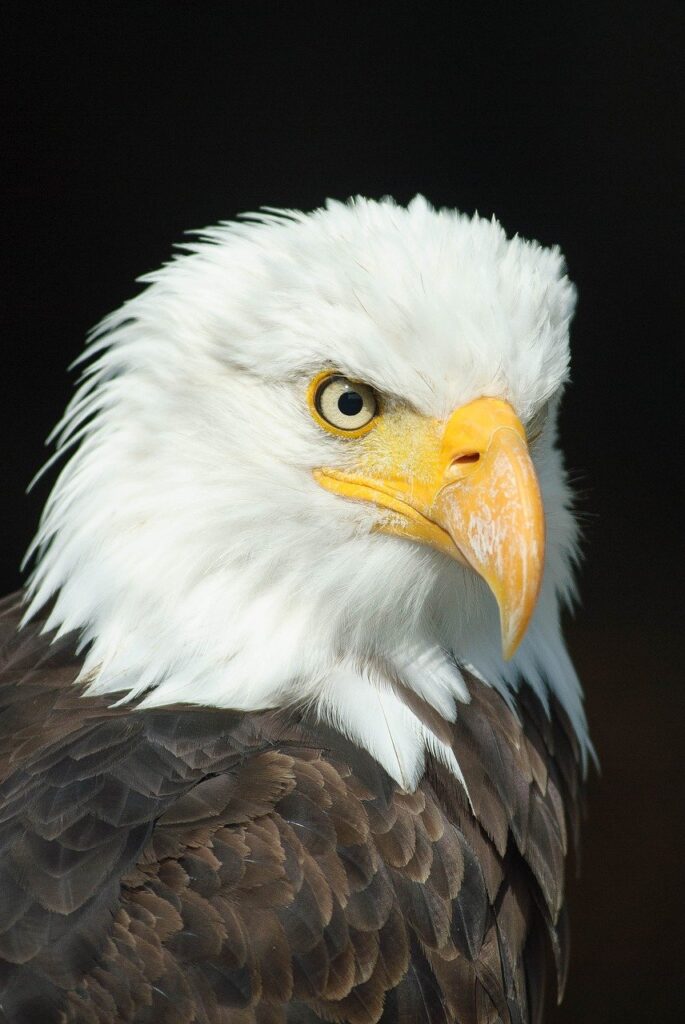
Sparrows? Really?
I’ve never thought of myself as a sparrow. No, I’ve always carried the banner of an eagle. Most of my adult life I’ve been an avid collector of ceramic eagles and eagle pictures.
In fact, let me share this tidbit. For something like eighteen years I’ve periodically eyed a coveted prize. There’s a shop in Concourse B of the Denver International Airport selling unique and expensive Western-themed items. They feature a life-size sculpture of an American Bald Eagle with a seven-foot wingspan. It’s feathered from beak to talons to tail feathers with individually dyed and hand-placed goose feathers and looks absolutely and completely real. It’s a stupendous work of art, and in eighteen years no one has bought it. I’ll give you seven thousand guesses as to why!
In a way I’ve always claimed that magnificent bird as being already mine, because if I had a spare $7,000, well, it would be mine! I have always considered the eagle to be the ultimate symbol of my success in the world as a man at the top of my career.
Okay, there’s a trace of delusion here, but I’ve always imagined that the eagle embodied my own spirit, my own independence, my own . . . everything.
The truth is the eagle didn’t embody my spirit. I embodied the eagle’s spirit. I could be underhanded, stealing the glory of those under me. I kept myself aloof, perched high above the fray and indifferent to the cares of others.

I indulged my temper and over the years had become quarrelsome, often angry, with a permanent scowl on my face.
Pentecostal and Evangelical churches, and to a lesser extent, even Fundamentalist churches pray for the Latter Rain, but so far, it seems their prayers have come up empty. Perhaps it is because it is not yet “the end of time”, or perhaps it is because, if their pews are filled at all, they are filled with costumed mannequins of habitual Christians
In the book, Acts of the Apostles, the followers of Christ locked themselves into a community center where they spent nearly two months hiding from the priests and rabbis, the Pharisees and the Sadducees, and the Romans who had killed Jesus. They prayed. They wept. They studied the Torah for themselves. They became familiar with the contracts made between God and Abraham, God and Isaac, God and Jacob. They discovered the prophecies of David, Isaiah, and Jeremiah. They learned the truth about the mission of the Messiah and how different it was from the myth of a conquering Messiah who would overthrow the hated Romans.
After 50 days, God’s presence, Jesus’ promised Holy Spirit, filled the hall they were in with such intense abundance and power and tangibility that it took on physical properties of light and sound. It had the appearance of tongues of fire alighting on every head, and the sound of wind rushing through the building. It filled them with its Holiness, animated them as it enlivened their own spirits, and imbued them with power to perform miracles.
In a farming metaphor, it was called “The Early Rain”, referring to the spring rains that sprout the fields of planted seeds. Just before the return of Jesus there will be an even greater rain of the Holy Spirit that will be known as “The Latter Rain”, represented by the fall rains that ripen the grains and ready the fields for harvest.
Deep down, though, I suspect it’s because all of us want to be eagles, even when our wings are broken. “Are you a sparrow?” He asked me, and I never answered.
Since getting fired in April of 2013, I’ve received one job rejection after another. Somehow, though, the Kaiser rebuff was the hardest one I’ve had to experience.
Why did it hurt so much?
- First, because the job description was almost word-for-word identical to my resumé.
- Because that agency lady, Alex, was convinced I was the best candidate out of all the names her network group had on file.
- Because I planned for that interview, and practiced for that interview, and researched for that interview. Hey, I was so gung-ho I even “joined” the Kaiser IT group on LinkedIn and “liked” their Facebook page and posted gushy stuff on both.
- Because I came to the interview prepared with my own set of questions for them.
- Because I was totally prepped for the hard questions and the open-ended questions, and I had planned how to turn the most negative or embarrassing or unwelcome gotcha question into an asset.
- Because I was super-convinced that I had nailed the interview!
- Finally, because in my heart I thought I was an eagle. An eagle with a broken wing, maybe, but it was mending.
The aftermath of Kaiser rejecting me was that I went into a spiraling depression that kept feeding on itself. My conversation with God slowed the descent but even that did not defeat the depression. For a week I spiraled. Darkness came every evening, but she came alone, without her companion, sleep. I would toss and turn and force myself to lie still and quiet my mind, and then I would sit up and sip water and fluff the pillows and stretch my calves by pulling my toes and the balls of my feet up, and then I would shift positions and start all over. Most nights I drifted off somewhere between one and two in the morning.
Then the sun would rise, and I would roll into the darkest part of the blankets and pillows and ignore it until eleven a.m. or later. I ran out of energy around two or three in the afternoon and would “lay down for a quick nap,” waking up hourly at four . . . and five . . . and six. Each time I would stubbornly refuse to stagger out of bed. Around seven in the evening, guilt would force me to roust myself for at least a brief spell of lethargic wakefulness. I’d get up and grumpily fix myself my first meal and only meal of the day.
By nine, no kidding, the darkness of my inner soul embraced the gloom outside Hebert’s cabin, and I’d fall back into bed. And that was it. The same conscience-numbing cycle would start over again. Every day the same thing. Every day, mindlessness. Not loneliness. Not sadness. Not even anger or self-pity. Just mindlessness. Just emptiness. Just . . . nothing.
The clock that was my life was stopping because I wasn’t winding it. I didn’t care. It didn’t matter anymore. I stopped checking the job web sites. I stopped reading my emails from the job engines. I stopped going to LinkedIn or Monster. I would have stopped going to Facebook, except I was bored when I wasn’t sleeping, and while Facebook was boring too, at least it gave me something to do in some kind of automatic mode while my mind atrophied and my soul stopped caring.
By the second Friday after the interview, I was dead. My body didn’t yet know it, but my spirit had departed.
That same Friday, the Friday I died, another friend texted me. It took a moment for Jeffrey’s telegram-like message to penetrate. Here’s what I read:

It took me a confused moment to remember that in Jeff’s case, “here” meant Paradise, California. It’s a pretty mountain community – or was until the raging Camp Fire of 2018 scorched 18,000 of its buildings right off the map – located in the northern part of the state. I was intrigued but knew full well it was more than six hundred miles from my current hideout in the San Jacinto Mountains.
The SMS messages bounced between us.
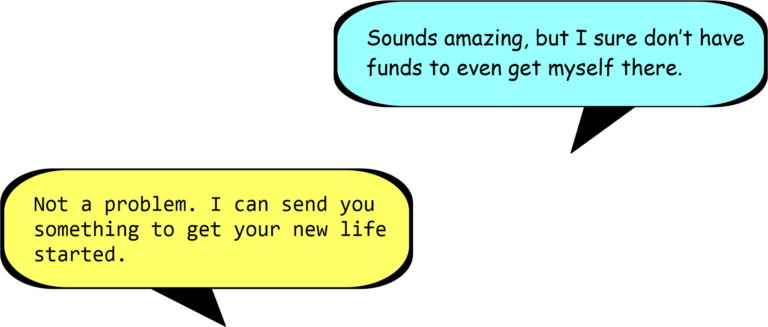
There was a brief Internet hiccup. The list of people I owed was longer than the evening shadows and I winced inwardly.
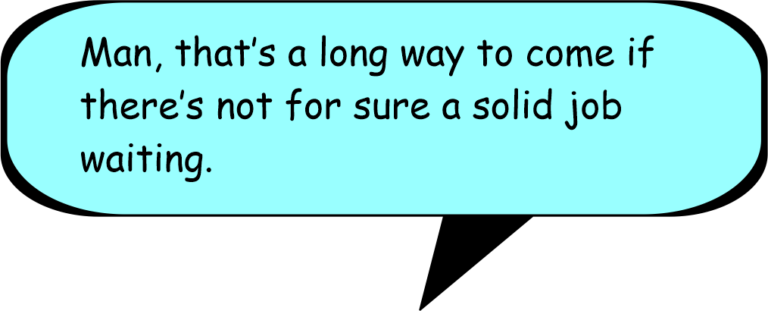
I was anxious about the fact that Paradise is a small community. If there was only one job opportunity on my horizon, it needed to be really solid to justify leaving the diversity and density of southern California. (Not that I was particularly basking in So Cal’s diversity by sleeping nineteen hours a day.)
For some reason Jeff wasn’t inclined to tell me what the pot-of-gold job was, but he did guarantee me it was 100% solid. In fact, he was not only recommending me for the position, but he was also contributing to the hiring process.
Signals were iffy there in the hills, but we finally connected by phone. “Look, Bruce,” he cajoled. “You’d be doing me a favor, actually.”
“How come?”
“Here’s the deal. I’m doing a short-term mission gig of my own, heading over to the Philippines.”
“Seriously?”
“Yeah. Around November, A bit earlier if I can swing it.”
“You? A missionary?”
“I know. Don’t laugh. But fact is, I’m looking for my own replacement, and you can do this easy.”
Jeff described to me how I’d be serving as a live-in care provider for a disabled man so he wouldn’t have to give up his residence and move into a rest home. The job paid just minimum wage, but it didn’t require any particular medical knowledge or the administering of medications. Best of all, my living quarters were included at no cost.
So, I tidied up the cabin, did a final perimeter sweep of all the stray pinecones, wrote Hebert an effusive thank-you letter, and nosed my car toward the Sierra Nevada foothills, murmuring to myself that maybe, just maybe, this fragile sparrow was going to catch himself a worm after all.
One week after arriving in Paradise I rear-ended a truck.
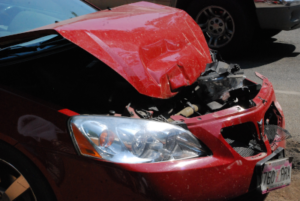 True story. As the sad old adage goes, “If it weren’t for bad luck, I’d have no kind of luck at all.”
True story. As the sad old adage goes, “If it weren’t for bad luck, I’d have no kind of luck at all.”
The collision destroyed the front end of my car including engine damage. Fortunately, no one was injured. Muttering curses to myself, I took photographs of the accident and dully filled out the police and insurance paperwork.
I called my insurance agent and he dourly planned for a claims adjuster to come out four days later to decide the settlement. I did cling to one slender thread of good fortune: my mishap happened just two days before my policy was to have lapsed.
About an hour before the guy was supposed to come survey the wreckage, I received a phone call from another friend I hadn’t seen or heard from in almost twenty-five years. “Bruce! How are things? What have you been up to?”
Skipping over the crumpled fenders and three divorces, I told him things were just peachy for me here in sunny Paradise. “What?” he almost yodeled. “That’s me too! That’s where I live now. Small world! Can we get together for lunch?”
It was awkward explaining that it’d have to be a restaurant within walking distance, and, um, he’d be paying for both his tacos and mine too. But I blurted out about the accident and that I was waiting for the adjuster to show up. He asked for my address and assured me: “I’ll meet you there.”
My friend Rico arrived first. We looked at the damage and both of us felt sure that the car would have to be totaled. “Will the settlement be enough to get another car?” he asked me.
“First, I have a $1000 deductible policy, and I don’t have a thousand bucks. Second, even if they gave me fair market Blue Book, it wouldn’t pay off what I still owe.” That’s how upside-down things were for me financially.
Rico and I cooled our heels until the claims guy pulled up. My first question to him was: “How do you determine when to repair and when to total a car?”
He surveyed the carnage with a critical eye. “Corporate policy is to authorize repairs up to twenty-five percent of fair market.”
He spent almost an hour examining the damage, snapping shots on his iPad and adding up the costs. His conclusion was to authorize repairing the car. I asked him how close to the threshold the repairs had come. He scanned the list again, then grinned. “You won’t believe it.”
“Try me.”
“Okay. Best I can estimate, to get you back to even, the fix will come to . . . 24.987%.” I’d survived ruin by exactly thirteen-thousands of a percentage point.
He asked me where I wanted to take it for repair, and Rico piped up with a recommendation. After the adjuster left, he put his arm around me. “Don’t worry about the deductible, bro. I got it.”
Tears sprang into my eyes. “Seriously?”
“God has blessed us. We’re good.” He gestured toward his own car. “Shall we? I’m hungry.”
As we ate, I told Rico about driving to Prescott, about the miracle gas that didn’t run out, about Dr. Roberts’ camp meeting testimony. After a pregnant pause, I forged ahead and even admitted to him about having a conversation with God. Things got really quiet after that, and I hoped Rico wasn’t regretting having this loopy friend pop up into his life.
It took the body shop four weeks to get all the parts, make the repairs, and repaint. When I got the call that the car was ready to pick up, I hiked two miles up the hill to bring it home. There had been hail damage to the hood, trunk, and roof. The new hood looked so good! In fact, the whole car looked like it was on a showroom floor. I examined it more closely and discovered that there was not any hail damage on the roof or trunk as well. I looked over at the shop owner, big question marks on my face. She just grinned and shrugged.
On Wednesday of that week, a tow truck pulled up. I met the driver and asked, “You here to repossess the car?”
“Yep.”
After he drove off with the car securely attached to the bed of his truck, I sat in the porch swing and thought long and hard about my life, especially my spiritual life. I thought about all the things I thought I knew and all the things I knew I didn’t know. I thought about the God I had rejected and the God I mattered to. I couldn’t believe that He had fixed the hail damage, too! I wondered if they were the same God or if they were different Gods. Yet, I knew He was the same God. He hadn’t changed. I had.
Six hundred miles and six weeks ago, I had jokingly dismissed His suggestion that I might be a sparrow. Now, six hundred miles away, still bereft, but ready to at least listen, I prayed a very simple prayer.
“Yes, God, I am a sparrow.” And in that prayer, I was reborn as Sparrow.
A still, small, familiar voice accompanied my rebirth, whispering in my ear, “Would you have come if I had told you the details?”
I left Paradise after two years. I was caring for a man with permanent concussion injuries that left him unable to care for himself. It was rewarding work. It was fairly easy work. But it was also emotionally draining work. Unfortunately, he was the center of a legal battle for custody and when it looked like he would be moved to New Mexico, I figured that was my cue. I packed up and headed to Dalton, Georgia.
I can tell you how I got to Dalton, but I can’t tell you why I’m here. My sister moved to this town about ten years earlier after her son drank himself into a tree, which earned him his own permanent concussion injuries. So, Mom moved to Dalton as well to be near my sister.
I can tell you the challenges I still face, but I can’t tell you how, or when, or if, or even why they will be solved. I’ve told you who I was: a Christian in name, an agnostic in claim, and an eagle in spirit. Now you know who I think I really am.
I can’t tell you who I am becoming because I don’t know yet. This God Guy in blue jeans says that’s His agenda and I don’t know what else to do but nod and say we’ll see. I can tell you that once upon a time, I knew everything. (Adventists always “know everything” and I’m pretty sure my name still lingers on their membership rolls somewhere.) I can also tell you that I don’t know anything anymore. I don’t know anything about myself, and I don’t know anything about God. He knows about me but not vice versa.
I don’t know why sin is. I don’t know how salvation is. I no longer engage in the ever-fruitless “works versus grace” debate. Where is Heaven? When is the end of the world? There ARE important truths in the Bible, but knowing about them is futile without the Spirit of God: Righteousness, Justification, Saturday or Sunday or Tuesday (or especially Thursday) being the “right” day on God’s changeless calendar. I don’t have opinions about 1844, 1888, six thousand years since creation or 13.8 billion years since the Big Bang. I do know that I’d like to start over, but I don’t know what that means or how to do it or even if it is possible. (How many times CAN a man return to his mother’s womb, anyway? I join Nicodemus in wondering about that one.)
It seems to me that living a spiritual life, more than anything else, means learning how people matter. I’d say now that hurting, lonely people matter more than doctrines, more than the Mark of the Beast or the Secret Rapture, more than whether we are living at the end of time or not, more than any other aspect of being a Christian. Perhaps people matter even more than my own personal, selfish relationship with God Himself because if they don’t matter as much to me as they do to God, then perhaps I don’t actually HAVE a personal relationship with God. I want to learn how to show people they matter to God and to me, without becoming their misplaced God.
The fallen angels are called demons. The fallen Adams are called sparrows.
“For are not two sparrows sold for a penny? Yet not one of them falls without the Father’s care. Are you not much more valuable than they?”[1]
After all of this, questions remain.
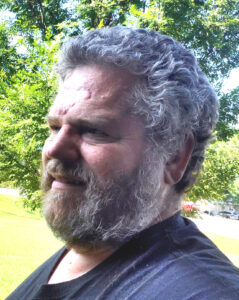 What do I know? I’m just a backslidden Adventist.
What do I know? I’m just a backslidden Adventist.
“Do not be afraid, for I have redeemed you.”[2]
What should I do? I want to be like the man who spoke to me on that mountainside. I want to care for sparrows. Yet, every time I set out to walk on that path, I fall on my face, both spiritually and physically (and I have the scars on my forehead to prove it.)
“For it is I who works in you, both to will and to do according to my good pleasure.”[3]
What am I?
“I have called you by name. You are mine.”[4]
My name is Sparrow, and I am His.
[1] Matt. 10:29
[3] Phil. 2:13
I often have thought about the Sparrow sitting in my living room and telling me his Sparrow story!! I will keep you in prayer as you “fly”/”walk” your journey.